- Home
- Jessie Haas
Shaper Page 2
Shaper Read online
Page 2
Give up! Chad thought. He locked his fingers behind his head and pressed his thumbs over his ears. If only he had a door to shut out the sounds. Instead he had a blanket. All of them had blankets. Even the bathroom door was a blanket.
David Burton’s house was full of doors: old doors with old iron latches, closet doors and hall doors, cupboard doors and shed doors. The kitchen alone had fourteen, counting cupboards and the two small iron doors in the hearth.
That house had been built long ago. Maybe no one had gotten around to building its doors for years either. Maybe that long-ago builder had stopped, once he’d got a roof over his family’s heads, and thrown himself into making a living, just like Gib.
Chad didn’t think so. That man would have been more like Jeep. He’d have finished his house.
Maybe David Burton traveled a lot. Maybe he’d need a house sitter. Chad saw himself spending long evenings down there, one bulb lit in a corner room as he studied, read, or just listened to the sounds of the hillside—
Splat! A suction dart whapped into the wall beside his head. Sky ducked back through the blanket, giggling. In again—thumpf! This time he hit the edge of Chad’s mattress and ran through the room to the back corner. The walls between the upstairs bedrooms didn’t quite meet the back wall of the house. Sky ducked through the gap into his own room and popped his head in again. “I got you! I got you!”
Chad bolted upright, grabbing at the clutter on his desk. Sky ducked back, giggling wildly from his own side of the wall. “I’ll throw it!” Chad said.
Not that it would hurt much. He’d grabbed a plastic watercolor palette, six shallow bowls crusted with dry paint. He rubbed the dust off with his thumb. Brown, green, scarlet—
His stomach squeezed. Last fall he’d been obsessed with the sumac clump at the bottom of Jeep’s field. He’d gone to try another version, to see if he could get something he was happy with, and he’d made Shep stay home so he wouldn’t drink the paint water. He’d made Shep stay, and when he came back—
Queenie barked in the yard. “Shut up, idiot!” Chad said aloud.
Sky raced downstairs, and in a moment Chad heard the shriek as he was swooped up into the air and settled on Jeep’s shoulders. Queenie kept barking. “Queenie!” Mom and Gib and Julia said. “Shh!”; “Quiet!”; “Shut up!”
“Good supper,” Jeep said. “Should have come!”
“I didn’t think the biscuits were all they should be!” Helen said. “Not the ones I had, anyway. But people seemed to like them.”
She went on to the gossip, with an occasional rumble from Jeep. Fire department first: That was aimed at Gib. Helen thought he should join, and that Jeep, at seventy, was old enough to be done with volunteer firefighting. Never mind that Gib had tried and couldn’t stand the mask on his face. It made him feel he was being smothered. Helen kept campaigning and comparing.
When that was done, she moved on to the new neighbor. Chad sat up then and stepped to his doorway.
Outside the three bedrooms ran a long balcony. Below were the dining room and living room, an open space the whole length of the house. His parents’ bedroom, the kitchen, and the bathroom were tucked beneath the balcony, out of sight, but the view to the main room was perfect. Chad could see all of them hanging on Helen’s words.
“He’s divorced,” she said. “Pretty recently. The furniture in that living room didn’t amount to a household, so I’d guess he hasn’t been on his own before.”
She was a noticer, Helen! Even now Chad saw her noticing the dining room table that was an energy-efficient lightbulb factory, the living room that was mostly computer station, the walls. In a moment she might wonder aloud if it had been such a good idea to encourage the family to write and draw on the unfinished wallboard. Would paint really cover it?
Not likely. Even Sky, who couldn’t write yet, had made his mark. Continuous lines, in different-colored crayons and markers, circled the entire house. Sky did them at high speed, not missing an inch, crossing forbidden furniture, charging through the bathroom no matter who was in there or why. At a higher level Julia’s most recent tantrums and enthusiasms were recorded: horse drawings, telephone numbers, big I HATE YOUS and big I’M SORRYS.
As a background pattern, barely visible from this distance, Chad could find a record of his own ups and downs. Pencil scratchings, small and square and neat: “julia & pete wilson,” with a wild orange Julia scribble over the top of it when she’d finally noticed. Four last-year’s batting scores, labeled “Jeep, Gordie, Phil, Me.” Lists of good books. Lots of bad drawings.
“The daughter’s fifteen,” Helen said. “One of these custody arrangements, I don’t know exactly what.” Gib shook his head, seen by no one but Chad, expressing mock amazement that there was anything about the Burtons that Helen didn’t know already. “She was supposed to come tonight with the animals, but I didn’t see any sign of it when we passed.”
Chad felt his interest in David Burton diminish. Divorce. Furniture. A daughter Julia’s age. David’s arrival, after that encounter at the rest area, had seemed full of significance, but this was sadly dull.
“What does he do for work?” Mom asked.
Jeep said, “Trains dogs.”
Chad drew back behind the blanket. That settled it. He wasn’t, going to get sucked into training Queenie. He didn’t want her. He’d said so the day Jeep brought her home. Nothing, nothing at all, could make up for what they’d done to Shep.
CHAPTER
4
OVER THE NEXT week Chad didn’t see David Burton or his daughter even once. A deer path overlooked the white house, and the walks Chad took to get away from his family, to make the long days shorter, brought him past fairly often. No one was ever outside.
From the overlook the house seemed small. The Polish woman from New York, that old lady with almost no vowels in her name, had done nothing to it, just moved in, aged, and died, while weeds took the lawn and the lawn took the driveway and the trees grew close around. The slate roof, green with mosses, blended with its surroundings. The only change that week was that an electric fence went up in the sloping field behind the house and a horse arrived. Not only was the girl Julia’s age, but she had a horse!
Once Chad walked by on the road. A cat sat on the doorstep, an alert tiger that noted his passing with clear green eyes. Chad hurried on, trying to shake the feeling that right now, this moment, the cat was reporting him to Burton.
Thursday, as they ate supper on the deck, Helen phoned. Her tiny voice was distinct to everyone at the table. “Your father wants help with the hay tomorrow.”
Mom’s face turned pink. “Couldn’t he have asked? We have a huge order to get out!”
“You know your father! The hay is cut: some for tomorrow and some for Saturday.”
Mom said, “Tomorrow he’ll have to make do with Chad and Julia!” She punched the reset button with her thumb. “It’s like I never grew up!”
“We could become vegetarians,” Gib said. “But as long as he gives us a side of beef every year and a horse for Julia, which he feeds, I guess he’s got a right to call on us.”
“He could ask!”
“Don’t hold your breath!”
Once—last year, in fact—Chad had loved being out there on the high sloping field with Jeep. He’d loved the farmhouse and barn above and the way the dark woods framed the field. He’d loved seeing the far hills fade to paint box colors: Prussian blue, ultramarine.
Now the last two people he wanted to be with were Jeep and Julia, and the last thing he wanted to think of was a paint box. Down at the bottom of the field was the clump of sumac where he’d sat and heard the faraway shot and paid no attention. Looking at the sumac made his stomach hurt.
He stayed on the wagon and stacked bales. It was the easiest job and the lone job. He didn’t have to say one word or even look down when Jeep or Julia might be looking up. He saw only the bales, maybe Jeep’s brown hands or Julia’s paler ones on the strings, then the place h
e was putting the bale, the green-brown scratchy wall he was building.
They stopped speaking to him. Soon they hardly spoke to each other. The only voice was Queenie’s sharp bark as she and Ginger hunted along the stone wall.
It was late afternoon when the last bales were stacked in the barn. Jeep took off his BARRETT BASEBALL cap and wiped his forehead with his bandanna. “Drink?”
He and Julia walked out of the barn, the dogs beside them. Chad waited. He heard them begin to speak as they got farther across the yard. The kitchen door banged shut.
Chad left the barn then and headed down the road. In a few minutes he angled off through the woods, along the trail that ended at the waterfall.
It was small, only eight feet high, but the rock rim spread the water into a broad veil. Cool mist hung in the air.
Chad peeled off his clothes, braced himself, and ducked under the icy shower. He used his hands like scrapers to get off the sweat and chaff. Water splashed from his body into the pool behind him, and for a second Shep was there drinking. Not really. But the sound was the same.
His whole skin tingled when he stepped out, and the warm air felt welcome. He dried himself with his T-shirt, pulled on his jeans, and knelt to tie his sneakers.
The water caught his eye. Greens and darks slid like oil over the surface. Look deeper, and the color stayed still while the water rippled under it. Chad followed a dent in the surface till it vanished. Another dent, just the same, glided downstream. Another. Suddenly the sound of the waterfall popped into focus, loud and constant.
Ow! He slapped his neck, and his hand came away bloody. Mosquito. Time to go.
He’d barely reached the road when he heard hoofbeats behind him. Julia had ridden to the farm; she must be riding home. He thought of fading into the brush until she passed, but he was bare-chested and already scratched from hay bales. He stepped into the ditch and kept walking, eyes down.
“Oh!” said a strange voice behind him. Girl.
Chad’s heart thumped at the base of his throat. He hesitated to turn; would she see that? But he had to turn. It would be rude not to.
The big bay horse was from David Burton’s. So this was the daughter.
She wore black, close-fitting black, and her body curved up like a sapling to a delicate collarbone and a long, slender throat. Her face was in shadow, framed by the black strap of a riding helmet.
“Hi.” He sounded like a frog.
“You must be Chad!” Her voice was almost too low to hear. Chad stepped closer.
She was beautiful. Simply beautiful. Her face was rosy brown and smooth and soft, the kind of face that’s hard to draw because the angles are so subtle. Her mouth spooned out a little shape in her cheek when she smiled, a dent like the moving dents on the surface of the pool. That shape would change when she spoke. He wanted to make her say something but couldn’t think of anything to say himself except “Yes. I’m Chad.”
“Thanks so much for helping Daddy!” the daughter said. “He’s been keeping an eye out for you, but he hasn’t seen you go by.”
“The cat didn’t tell him?” Oh, God, had he said that out loud? He felt himself go red, but the girl smiled, and he couldn’t look away.
“Malkin? No, he didn’t mention it!” She swung out of the saddle. The horse heaved a sigh and shook itself, with a flap and squeak of leather. “I’m Louise. This is Rockefeller—I don’t know why. That’s the name he came with.”
Even on the ground she was taller than Chad. His eyes were on a level with the dip in her collarbone. He was horribly aware of his own bare upper body, so close. She must be wondering how someone this skinny could have moved all that furniture.
His shirt was balled up in his hand. Could he? He decided he could and stepped back a little and pulled it over his head, inside out, wet from drying off his body. It clung to him and smelled of sweat and hay, but he was covered. She started walking. She was going to walk down the hill with him.
“What kind of horse is Rockefeller?” Something to say.
“Just a mutt, I think. One of Daddy’s experiments. He’s actually a failed bucking bronco, can you believe it?”
“What?”
“Yes! Daddy bought him at an auction; he was probably headed for a dog food can. Well, several!” She made a gesture at Rockefeller’s large side.
“What was the experiment?”
“To see if he could turn him into a safe riding horse. Mum—” She broke off. Sadness dented her cheek in a different way. “Mum had a field day with that.” She assumed a voice that was harsh and angry, with a city accent. “‘Imagine! He bought a twelve-year-old girl a bucking bronco!’”
“Cool!” was all Chad could think to say.
“I thought it was cool! And Rocky’s perfectly safe. He actually wasn’t much good as a bucker. You know, ‘been there, done that!’”
Indeed, Rockefeller didn’t look as if he could muster the energy to buck anyone off. His ears flopped. His eye was mild and lazy and bored. But horses were deceptive. “Bet his name is really Rock a Fella,” Chad said.
Louise looked questioningly at him.
“You know, rock a fellow?”
“Oh!” The look she gave him was surprised and respectful. “I’ll bet you’re right. I can’t wait to tell—”
Rocky stopped walking and craned his neck to look back up the road. Hoofbeats. Chad bit his lip to keep from swearing. “This’ll be my sister, Julia.”
“Uh-oh!”
Uh-oh? Chad thought. Uh-oh?
“I’m not supposed to ride with her. Daddy thinks her horse might be a bad influence on Rocky. What should I say? I don’t want to insult her.”
Chad’s mind moved too slowly to find an answer in time. Queenie came into sight, paused, barked sharply, and raced down the hill. Rockefeller waited calmly. Still out of sight, Julia yelled, “Queen! Come! Queenie, quiet!”
Tiger cantered into view, head down, boring on the bit. If he managed to yank the reins from Julia, he would bolt. He’d been doing that a lot lately.
But though Tiger foamed and worried at the bit, this time he couldn’t budge Julia. She braced, biceps swelling, and skidded him to a stop, flung herself off in a flying dismount, and grabbed Queen by the collar. “Hi!”
Louise didn’t look at her for a moment. She was watching how Rocky stood, head high, ears back tensely. When she turned, she blinked at Julia’s black sports bra top and deep tan shoulders, purple chaps over tie-dyed shorts, polka-dotted helmet.
“I’m Louise. I’ve been looking forward to meeting you—What a beautiful horse!”
Julia flushed. “Thanks. He belongs to my grandfather really. I mean, he bought him for me to train.”
“Oh, then you’ll understand,” Louise said, and explained Rockefeller’s background, his need for extremely calm riding companions. Julia was fascinated. Chad walked beside the two of them, the two horses, Queenie, feeling as if he’d just become invisible.
A string of brilliant tie-dyed laundry showed through the trees. Don’t look! Chad thought at Louise. Their house was hideous, a rough board chalet perched above the cellar/garage Mom and Gib had lived in while they built. There was a little horse barn out front and a brushy pasture and a vegetable garden. Parked near the road was one of Gib’s old cars with a sapling growing through the bumper.
Louise’s face brightened with interest, and she started to say something, but Julia kept talking, kept walking. Chad stopped, unnoticed, and watched them disappear down the road. Louise had taken her helmet off. Her hair was dark and very short and lay like feathers against her head.
She was Julia’s age, not his. She was a girl. Still, this wasn’t what he’d expected, not after that “uh-oh.”
The smell of frying onions filled the house. Mom stood at the stove, phone pressed between ear and shoulder as she stirred. “There’s not much I can do about it, Ma. Believe me, we’ve tried. He’s—implacable. Is that the word I want? He’s like a rock.”
Me, Chad thou
ght.
“I know,” Mom said. “I know. It’s like he’s shut himself down. He doesn’t play baseball, he doesn’t see his friends—no. No. He used to be such a neat kid. I know.” Her dark braid, streaked with gray, moved against her blue and hot pink back. “Tell Dad we’ll all come hay tomorrow. He won’t have to go through that again!”
Chad went to the refrigerator for a glass of milk, deliberately pushing himself into her awareness. “Anyway,” Mom said, “I’m in the middle of cooking dinner. See you!” She hung up. “Hey, dude!”
Chad just looked at her. He was meant to say “hey” back, but he didn’t. Mom’s tight smile faded. She looked pale. Not much time outdoors this summer. Even her freckles were pale, but a flush came up under them.
“Hey,” she said gently. “You have to let go of it, Chad.”
“Why?”
“Why? Because—because it wasn’t anybody’s fault! It just happened.”
Chad couldn’t believe how fast the anger took him, rising through his body like the red in a thermometer. “What do you mean, it wasn’t anybody’s fault? Did she accidentally take him along? Did Jeep accidentally shoot him? Didn’t he know it was loaded?” He swung away, stepped in Queenie’s water dish, and kicked it across the floor. It smacked into the wall on the other side of the house and water sloshed up the wallboard, turning Sky’s lines into a drippy rainbow.
“Chad Holloway, stop it this instant!”
Already the anger was turning sick in Chad’s stomach. It was too late to be angry, too late for any of this.
“The dog was in agony!” Mom said. “That’s why—”
“That’s why they have vets! Did you ever hear of vets? They’re like doctors, only for animals, Mom! Why didn’t he take him to a vet?”
“Because—Oh, now look what you’ve made me do!” She moved the smoking onions off the burner. “Listen to me, Chad. The dog couldn’t be saved—”

 Chase
Chase The Sixth Sense
The Sixth Sense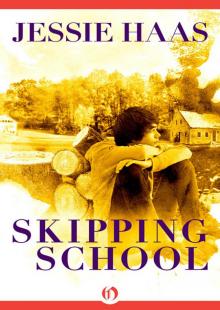 Skipping School
Skipping School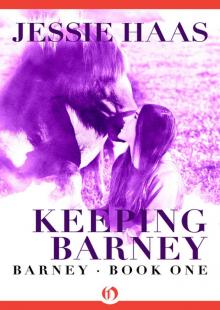 Keeping Barney
Keeping Barney Unbroken
Unbroken Westminster West
Westminster West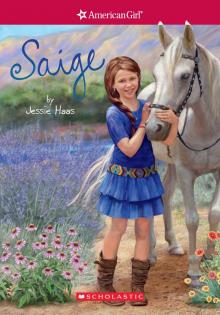 Saige
Saige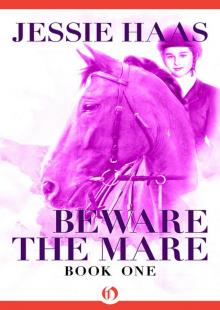 Beware the Mare
Beware the Mare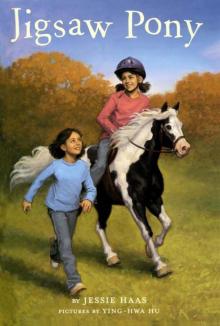 Jigsaw Pony
Jigsaw Pony Rescue
Rescue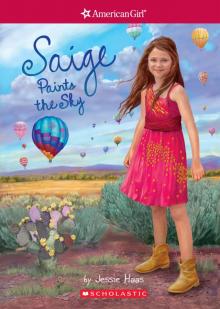 Saige Paints the Sky
Saige Paints the Sky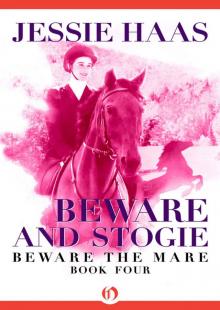 Beware and Stogie
Beware and Stogie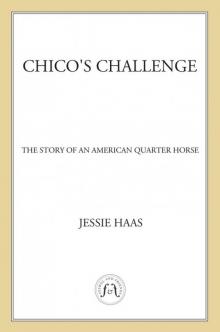 Chico's Challenge
Chico's Challenge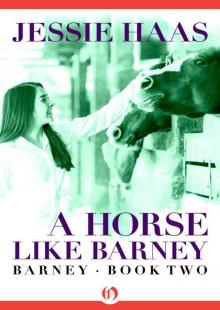 A Horse like Barney
A Horse like Barney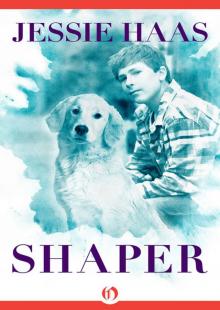 Shaper
Shaper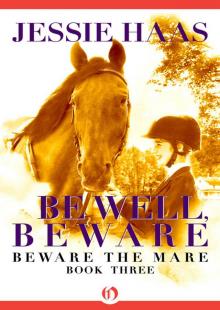 Be Well, Beware
Be Well, Beware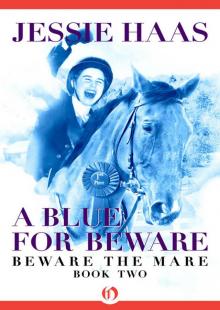 A Blue for Beware
A Blue for Beware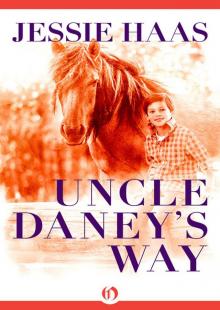 Uncle Daney's Way
Uncle Daney's Way